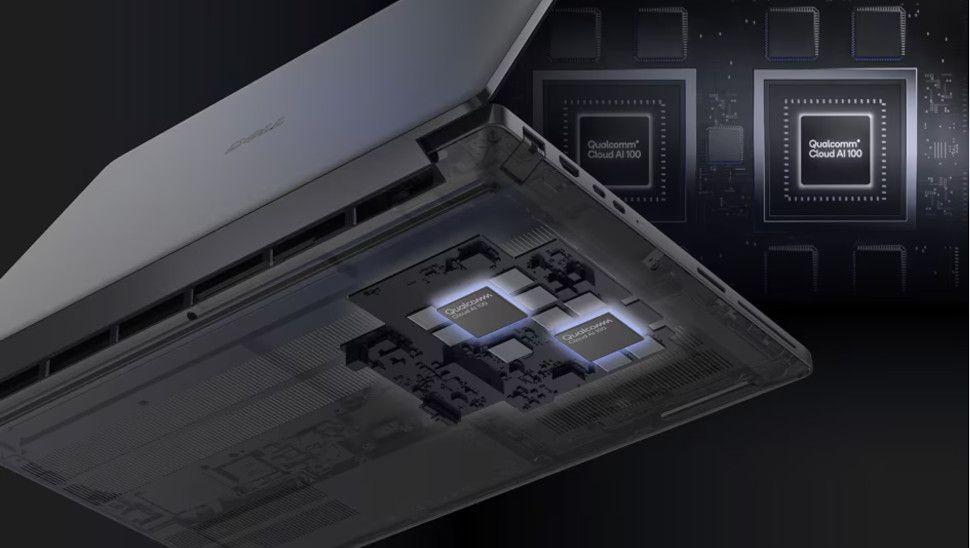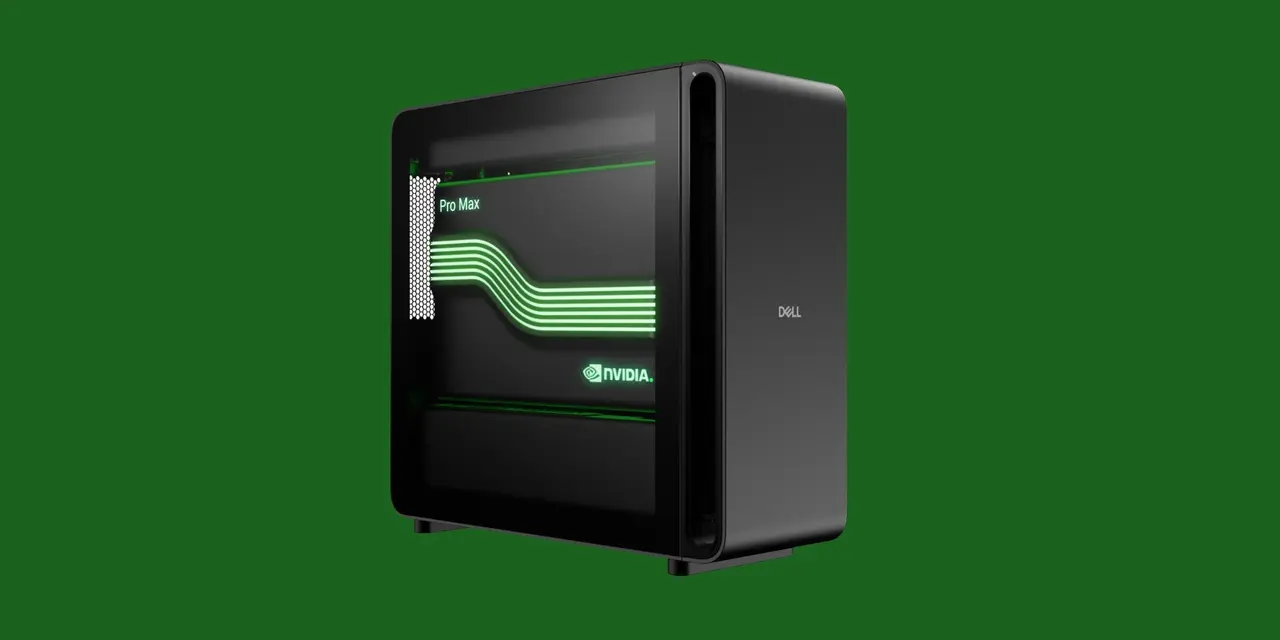Dell Unveils Pro Max Plus: The First Mobile Workstation with Enterprise-Grade Discrete NPU
5 Sources
5 Sources
[1]
Dell Ditches the GPU for an AI Chip in This Bold New Workstation Laptop
If you're after laptop buying advice, I'm your man. From PC reviews to Starlink testing, I've got more than a decade of experience reviewing PCs and technology products. I got my start with PCMag but have also written for Tom's Guide and LaptopMag.com, and several other tech outlets. With a focus on personal computing (Windows, macOS, and ChromeOS), Starlink satellite internet, and generative AI productivity tools, I'm a professional tech nerd and a power user through and through. Dell just made a major play in AI hardware with its new Pro Max Plus workstation laptop, announced at Dell Technology World. Moving beyond conventional graphics chips for crunching big AI tasks, the Dell Pro Max Plus features discrete, enterprise-grade AI inference hardware based on a new neural coprocessor from Qualcomm. Built to run large, multi-billion-parameter AI models locally, the Pro Max Plus is a significant step forward for businesses that want to implement and test advanced AI tools. Here's everything else we know about this new beefy portable AI PC and how it's another herald of the imminent machine learning revolution. Detailing the Dell Pro Max Plus AI Workstation While the Dell Pro Max line includes the expected workstations with robust ISV-certified graphics and other pro-grade features, this spin-off Pro Max Plus workstation ditches the GPU entirely in favor of a discrete neural processing unit (NPU). This dedicated NPU is a Qualcomm AI 100 PC Inference Card -- the first enterprise-grade discrete NPU in a workstation laptop. Built for the usual workstation crowd of engineers, developers, and data scientists, this supercharged AI processor can run cloud-level AI models with billions of parameters on the device. Cloud-level AI models include certain chatbots, image generation tools, voice processing, and retrieval augmented generation (RAG) models that leverage your own selection of documents and data for proprietary business uses. Qualcomm's hardware is packaged as a discrete expansion card, similar to a laptop GPU housing, but outfitted with 32 AI cores, 64GB of onboard LPDDR4x memory, and a thermal envelope of up to 150 watts. Because it's an NPU explicitly built for neural networks and AI inferencing, it promises to deliver better performance-per-watt than any comparable AI-capable GPU. Many specifics about the new Pro Max Plus workstation laptop are still in the air. Dell wouldn't tell us a price or even commit to a screen size, saying only that it would be in the 16- to 18-inch range. Those details will surely firm up as we get closer to a launch later this year. Why On-Device AI Matters for Enterprise Dell claims the Pro Max Plus will run a 109-billion parameter model miles beyond any current standalone mobile workstation. (However, this is nowhere near large enough for something like OpenAI's GPT-4, a 1.8 trillion parameter model.) It will also run that model entirely on the device, without needing to connect to a server, access a cloud service, or share data with anyone or anything else. That's a significant selling point for businesses, as it allows them to keep data, AI-produced materials, and even original prompts completely private. In the AI age, all these new capabilities and assets will become priceless intellectual property for businesses. Locally run models also cut costs for maintaining or renting space in a server environment. These local models could also promote more rapid iteration as developers can now use AI anywhere to generate code in a secure and private environment. Dell will also support this new workstation with its Dell Pro AI Studio ecosystem of AI tools, from foundation models and reference designs for building AI apps, tools for deploying AI models, and even management tools to let IT work with APIs and model updates for proper business support. The Takeaway: An AI Laptop in a New Field of AI Boxes Dell's move into powerhouse AI laptops is a bold play to jump the line, as several competitors have recently launched desktop AI boxes. These are so new that we don't have a good name for this emerging desktop PC category. (AI boxes? Mini supercomputers? Chime in down in the comments if you have any suggestions!) The point is that this is nothing like a consumer-focus AI PC. It's built for prototyping and fine-tuning AI models or running cloud-level models locally. Whether a company wants to add AI features to its apps or an individual developer wants local AI for crunching numbers and vibe coding a new project without sharing data anywhere, these new machines deliver unbridled power, specifically built for AI. Nvidia's DGX Spark puts a powerful GB10 card into a mini PC form factor, while the larger GB300 card is showing up in massive desktops, like the Nvidia DGX Station. The major PC brands are all following suit, rolling out their own AI workstations. (Dell is also on this trend, with its own Nvidia-powered Pro Max desktops.) But Dell is the first (and so far only) company to do anything similar in a mobile workstation. This Qualcomm NPU in a discrete, mobile-ready form factor could be another turning point as the demands for AI development push past anything current systems can handle. Will we see other AI workstation laptops at Computex? Possibly, but I suspect this announcement from Dell will leave a lot of PC makers playing catch-up.
[2]
Dell's latest laptop triples down on AI with a discrete NPU
AI has been at the forefront of every tech company's press release and product, but Dell is taking things a step further with its latest laptop. The Dell Pro Max Plus was announced today, and it's the first mobile workstation ever to feature a discrete NPU. Related I don't like AI, but Adobe Acrobat's latest AI features are impressive: 5 big reasons why Adobe Acrobat's AI Assistant and other features are worth using, and even paying for Posts Dell is going all-in on AI Close Laptops with discrete NPUs aren't entirely new, but the last time you probably heard of them was when Microsoft launched the Surface Laptop Studio 2, which featured the Intel Movidius VPU (before the industry settled on the NPU denomination). That was a terrible AI processor, though. This time, Dell is going all-in. The main selling point of the new Dell Pro Max Plus is the Qualcomm AI 100 inference card, which Dell says includes two AI 100 cards for a total of 32 AI cores and 64GB of on-board memory, which is separated from the main RAM of the system. This allows the Dell Pro Max Plus to handle Large language Models with up to 109 billion parameters. This also makes the Dell Pro Max Plus the first-ever mobile workstation to ship with an enterprise-grade discrete NPU. For the most part, laptops have been focusing on integrated NPUs on the same package as the CPU, while leveraging the GPU for more intensive AI workloads. However, having a discrete NPU is unique and should prove useful for AI developers. Related What are AI TOPS? Explaining a largely meaningless term If you've seen companies marketing based on "AI TOPS", here's what that means and why it's largely meaningless. Posts 1 That's all we know Close If you don't think the discrete AI processor is exciting enough, you're out of luck with today's announcement, as Dell's press release and spec sheet includes no other information in terms of specs. We don't know what the CPU is or if there's still a discrete GPU considering the extra space taken by the discrete NPU. From looking at the official press images, though, you can still see the laptop is about as thick as you'd expect a mobile workstation to be, so this won't be a lightweight machine. It's also worth noting that the Plus designation here should mean we're looking at one of Dell's mid to upper range workstations, something in line with the old Precision 5000 or 7000 series. We also don't know of a release date or pricing, so there's still time for the company to reveal more details. Related 5 ways AI can help boost your productivity To help manage your busy day, you should consider turning to the wealth of available AI tools to help boost your productivity. Posts 1
[3]
Dell stuffed an enterprise-grade NPU into its new Pro Max Plus laptop
The Qualcomm AI 100 PC Inference Card features 32 cores and 64GB of memory. Dell just announced the new Pro Max Plus laptop, which the company has stuffed with an enterprise-grade NPU. This makes it a top-tier choice for on-device AI applications. The Pro Max Plus features the Qualcomm AI 100 PC Inference Card, making it the "world's first mobile workstation with an enterprise-grade discrete NPU." This NPU offers 32 AI-cores and 64GB of memory. This is enough to directly handle the type of large AI models that typically require the cloud to run. We don't know anything else regarding traditional specs, but we do know that this will be one of . The other models won't be quite as focused on advanced AI applications. Dell says this laptop is primarily intended for "AI engineers and data scientists," and so it's held off on announcing pricing. Given the specs, it's likely to be way too expensive for traditional consumers. It's coming out later this year. The company also revealed new server designs and a new cooling system for these servers. Dell's PowerCool Enclosed Rear Door Heat Exchanger (eRDHx) is an alternative to standard rear door heat exchangers. Dell says it captures 100 percent of heat generated via a "self-contained airflow system." It also suggests it can reduce cooling energy costs by up to 60 percent when compared to current alternatives.
[4]
Dell's super-powered new mobile workstation has one crucial feature which sets it apart from all the competition
This offers the opportunity to carry out high-intensity AI tasks, even on the move Dell has unveiled an AI PC with a never-before-seen feature it hopes will spur on the next levels of productivity. Revealed at Dell Technologies World 2025, the new Dell Pro Max Plus laptop is the first to feature an enterprise-grade discrete NPU, offering the opportunity to carry out high-intensity AI tasks even on the move. The mobile workstation features a Qualcomm AI 100 PC Inference Card with 32 AI-cores and 64GB memory, which Dell says should be more than enough to handle the needs of AI engineers and data scientists deploying large models for edge inferencing. Speaking at the event, company CEO Michael Dell addressed the upcoming Windows 10 end of life, hinting that for many users, the ideal solution is to buy an AI PC such as the Dell Pro Max Plus. "Personal productivity is being reinvented by AI," Dell said, "the install base of a billion and half PCs is ageing, and it's being replaced with AI innovation." "The Windows 10 end of life is coming, and we are ready - Dell is the leader in commercial AI PCs, and we're further distancing ourselves from the competition." The CEO highlighted the new Dell Pro Max device during his keynote address, noting it would be ideal for developers and scientists, offering up to 20 petaflops of performance due to embedded Nvidia GB300 hardware, and up to 800GB of memory - enough to run and train models with a trillion parameters. "Today's PCs are becoming AI workstations - blazing fast, all-day battery life powered by NPU and GPU innovation," Dell declared.
[5]
Dell's new laptop ditches the GPU for a discrete NPU -- here's why that's a big deal
Dell's Pro Max Plus is built to run massive AI models locally. No GPU, no cloud, no compromises. At Dell Technologies World 2025 this month, one laptop quietly stole the show, and it didn't even have a GPU. The new Dell Precision Pro Max Plus is a mobile workstation with a bold twist: It ditches the graphics card for an enterprise-grade discrete NPU. That might sound niche, but it's a big deal. This is the first notebook we've seen that treats AI as the primary workload, not graphics, gaming, or CAD. It's powered by a dual-chip Qualcomm AI 100 card with 64GB of dedicated memory. Dell ran a 109-billion-parameter Llama 4 model in a live demo on the laptop without an Internet connection or cloud server. The star of the show is the Qualcomm AI 100 PC Inference Card. It's a dual-SoC module based on Qualcomm's Cloud AI 100 chip, silicon that was originally designed for data centers. In this configuration, you get 32 AI cores, 64GB of LPDDR4x memory, and around 450 TOPS (trillions of operations per second) of 8-bit AI compute. That's an order of magnitude more AI power than even the latest Copilot+ PCs. To make room for this monster, Dell removed the GPU entirely. Unlike other Pro Max Plus configs that offer Nvidia RTX graphics, this model swaps the discrete GPU slot for the Qualcomm card. That's a trade-off for sure, but if you're not rendering video or playing games, it's a smart one. Let's talk raw AI power. Apple's M4 MacBook Pro has a 16-core Neural Engine that maxes out around 38 TOPS. Intel's upcoming Lunar Lake CPUs hit around 48 TOPS. Snapdragon X Elite sits at 45 TOPS, and AMD's best integrated NPUs are around 55 TOPS. Dell's Pro Max Plus? 450. That's ten times more TOPS than the Snapdragon X Elite. This isn't just about numbers, though. Dell's card has a 64GB memory pool, meaning it can keep huge models entirely in local RAM without pulling from system memory. That's essential for developers working with large LLMs, vision models, or local inference. It's important to be mindful of who this machine is actually for. It's not for gamers, students, or your average office user. Rather, the Pro Max Plus, with its discrete NPU, is aimed at data scientists, AI engineers, and developers who need to run massive models offline, securely, and on the go. At Dell Technologies World, the company demonstrated its new Pro AI Studio toolkit running on the device. It includes use cases like modifying code in a game engine with natural language and deploying fine-tuned models without touching the cloud. There are apparent advantages here for high-security industries. Running sensitive data through a local model means no cloud leaks or latency risk. This workstation is effectively an AI edge server you can throw in a backpack. That opens the door for field applications in defense, healthcare, manufacturing, or disaster response: Anywhere fast, private AI inference is needed on the edge. The Qualcomm AI 100 card is built on a 7nm process and uses two chips connected over PCIe. Each one offers 16 AI cores and 32GB of memory. Together, they act as a unified engine with enough bandwidth to handle some of the largest models available today. In terms of thermal management, the card is designed to operate under a 75W thermal design power, which is considerably more than typical NPUs found in consumer laptops (usually under 10W). That means Dell had to account for additional cooling and power delivery, but in return, you get server-class performance without a server. Apple's M3 and Intel Lunar Lake are both fabbed on advanced 3nm TSMC nodes, while Snapdragon X Elite and AMD Ryzen AI are built on 4nm. Qualcomm's 7nm tech may be older, but it's optimized for efficiency under sustained AI load. Sure, it won't render a Pixar movie, but it will run Llama 4 Scout locally... and that's arguably a more impressive flex nowadays. The arrival of discrete NPUs in laptops like the Pro Max Plus marks a major inflection point in mobile computing. Michael Dell summed it up during the opening keynote of Dell Technologies World 2025: "Personal productivity is being reinvented by AI. We're ready." Historically, workstation-class machines have revolved around GPUs, but PUs are general-purpose compute units that weren't purpose-built for deep learning inference. With the Pro Max Plus, it's clear Dell isn't just ready: It's pushing the workstation category into uncharted territory. Dedicated NPUs, especially ones with large memory pools and optimized interconnects, change the game. They're smaller, more power-efficient, and deliver far more performance per watt for AI-specific tasks. This unlocks use cases previously restricted to datacenter servers or cloud instances for professionals building and deploying AI models. Expect more vendors to follow suit. We're already seeing Copilot+ PCs push integrated NPU performance, but Dell's move hints at a future where premium workstations could offer GPU, NPU, or hybrid configurations. If you're building the future of AI, your next workstation might not have a GPU. And with laptops like this, it might not need one.
Share
Share
Copy Link
Dell introduces the Pro Max Plus, a groundbreaking mobile workstation featuring a discrete Neural Processing Unit (NPU) designed for high-performance AI tasks, marking a significant shift in laptop design for AI applications.
Dell Introduces Revolutionary AI-Focused Laptop
Dell has unveiled the Pro Max Plus, a groundbreaking mobile workstation that marks a significant shift in laptop design for artificial intelligence applications. This new device is the world's first mobile workstation to feature an enterprise-grade discrete Neural Processing Unit (NPU), setting it apart from conventional laptops
1
.Powerful AI Hardware

Source: TechRadar
The Pro Max Plus is equipped with a Qualcomm AI 100 PC Inference Card, a dual-chip module that includes:
- 32 AI cores
- 64GB of dedicated LPDDR4x memory
- Up to 450 TOPS (trillions of operations per second) of 8-bit AI compute
5
This hardware configuration allows the laptop to handle large language models with up to 109 billion parameters, a capability previously limited to cloud-based systems
2
.Unique Design Approach
In a bold move, Dell has chosen to remove the discrete GPU entirely from this model, replacing it with the Qualcomm NPU. This decision reflects a shift in focus towards AI-specific workloads rather than traditional graphics-intensive tasks
1
.Target Market and Applications
The Pro Max Plus is primarily aimed at:
- AI engineers
- Data scientists
- Developers working with large AI models
It's designed for tasks such as:
- Running and fine-tuning large language models
- Deploying AI models locally without cloud dependencies
- Handling sensitive data in high-security industries
5
On-Device AI Capabilities
The laptop's ability to run substantial AI models locally offers several advantages:
- Enhanced data privacy and security
- Reduced reliance on cloud services
- Lower costs associated with server maintenance
- Faster iteration for AI development
1
Related Stories
Dell's AI Ecosystem
To support the Pro Max Plus, Dell is introducing its Pro AI Studio ecosystem, which includes:
- Foundation models
- Reference designs for AI app development
- Tools for AI model deployment
- Management tools for IT departments
1
Industry Impact and Future Trends
The introduction of the Pro Max Plus signals a potential shift in the mobile workstation market. As AI becomes increasingly central to various industries, we may see more manufacturers following Dell's lead in prioritizing AI processing capabilities over traditional GPU-centric designs
4
.Availability and Specifications
While many details about the Pro Max Plus remain undisclosed, Dell has confirmed:
- The screen size will be between 16 and 18 inches
- The laptop will be available later this year
- Pricing information is yet to be announced
3
As the first of its kind, the Dell Pro Max Plus represents a significant milestone in the evolution of AI-focused mobile workstations, potentially reshaping the landscape of portable computing for AI professionals.
References
Summarized by
Navi
[2]
[4]
Related Stories
Dell Unveils Groundbreaking 20-PetaFLOPS Desktop Powered by Nvidia's GB300 Superchip
19 Mar 2025•Technology

Dell admits consumers don't care about AI PCs as Microsoft's Copilot strategy falters
07 Jan 2026•Technology

Dell Unveils Comprehensive AI Infrastructure Solutions at Dell Technologies World 2025
20 May 2025•Technology

Recent Highlights
1
OpenAI secures $110 billion funding round from Amazon, Nvidia, and SoftBank at $730B valuation
Business and Economy

2
Anthropic stands firm against Pentagon's demand for unrestricted military AI access
Policy and Regulation

3
Pentagon Clashes With AI Firms Over Autonomous Weapons and Mass Surveillance Red Lines
Policy and Regulation





